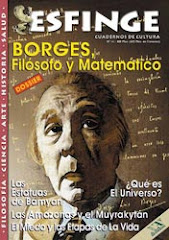How the work of a Latin-American literary giant
found a home at UVA
by Emma Rathbone
C. Jared
Loewenstein and Jorge Luis Borges
It's not
often that an offhand remark can change the course of a man's life. But that's
exactly what happened to C. Jared Loewenstein (Col '66, Grad '92).
In 1967,
Loewenstein heard that the celebrated and influential Latin American author
Jorge Luis Borges was coming to the University to give a lecture on Edgar Allan
Poe. An admirer of Borges' work, Loewenstein attended both the reading and a
party afterward at the Colonnade Club, and found himself waiting in line to
meet the author. The man in front of him asked Borges a question about
Jefferson, to which Borges replied, "Ah yes, Thomas Jefferson, the
architect of democracy, and the democrat of architecture."
Loewenstein
found the quote remarkable in the way it summed up Jefferson's essence with
such casual precision. "When I met him and heard that comment," says
Loewenstein, "I thought I had to get to know him better."
Thus began
a lifelong fascination with the author, the cumulative effect of which has been
one of the world's best and most expansive collections of Borges' work, housed
in the Albert and Shirley Small Special Collections Library.
Borges in
1976
For half a
century, Loewenstein worked for the University Library, where he started out
shelving books in Alderman as a student and eventually became head of the
reference department.
"This
man from Luray, Virginia, meets Borges for the first time, and it changes his
life," says Eduardo Montes-Bradley, a filmmaker who is working on a
documentary about the two men, focusing on Loewenstein and how his life has
been influenced by the author. "In real life, that isn't something that
even Borges could have written about."
The two men
didn't cross paths again until 1970, when they met at a conference in New York.
They eventually spent time together in Argentina, where Loewenstein came to
know Borges on a more personal level.
"He
was very low key, very retiring, very shy," says Loewenstein, "and
not entirely at home in his fame. He was expected to be some kind of oracle,
and he wasn't comfortable with that."
Loewenstein
Loewenstein
tells the story of going to lunch with the author during a literary conference.
"Everyone there was expecting some amazing lunchtime fête," he says.
When the waitress brought Borges his Coke in a bottle, the author talked at length
about the Coca-Cola logo, the unmistakable script, how it could be recognized
no matter what the language. "Later he said to me, 'I think they were
expecting something different,' and he kind of chuckled. I think he recognized
what an icon he was."
Loewenstein
traveled to Buenos Aires again in 1976, visiting bookstores and letting the
owners know that UVA was interested in acquiring the author's works.
The
windfall came in 1977, when Loewenstein received a call from a collector in
Buenos Aires who said that he had around 400 of Borges' works and offered to
sell them. Loewenstein made arrangements, and once the books arrived, the
Borges Collection had begun.
"Things
just kept happening," says Loewenstein. "We added other books,
translations, other manuscripts … under one roof." The collection allows
scholars to follow the evolution of some of Borges' work from manuscript form
to first printing to complete works. "That's a very powerful tool for literary
scholars. It's a way of looking at his development as a writer."
One of
Borges' drawings
"The
collection is extremely valuable," says María-Inés Lagos, a UVA professor
of Spanish. "There are things here that are not available anywhere else.
There are drawings, and being able to see and touch the manuscripts is an
amazing experience."
Lagos once
took a professor from New York University, a Borges scholar, to see the items.
"She was amazed and could not believe the things we had. I don't think
people are aware that we have this incredible collection."
The
collection now contains 2,500 to 3,000 items, including one of three known
first-edition copies of Moon Across the Way and a first-edition copy of Fervor
de Buenos Aires.
"Borges
changed the destiny of Jared Loewenstein," says Montes-Bradley. "In
the process, the University of Virginia ended up with one of the greatest
treasures in literature."
Fuente : University Virginia


































